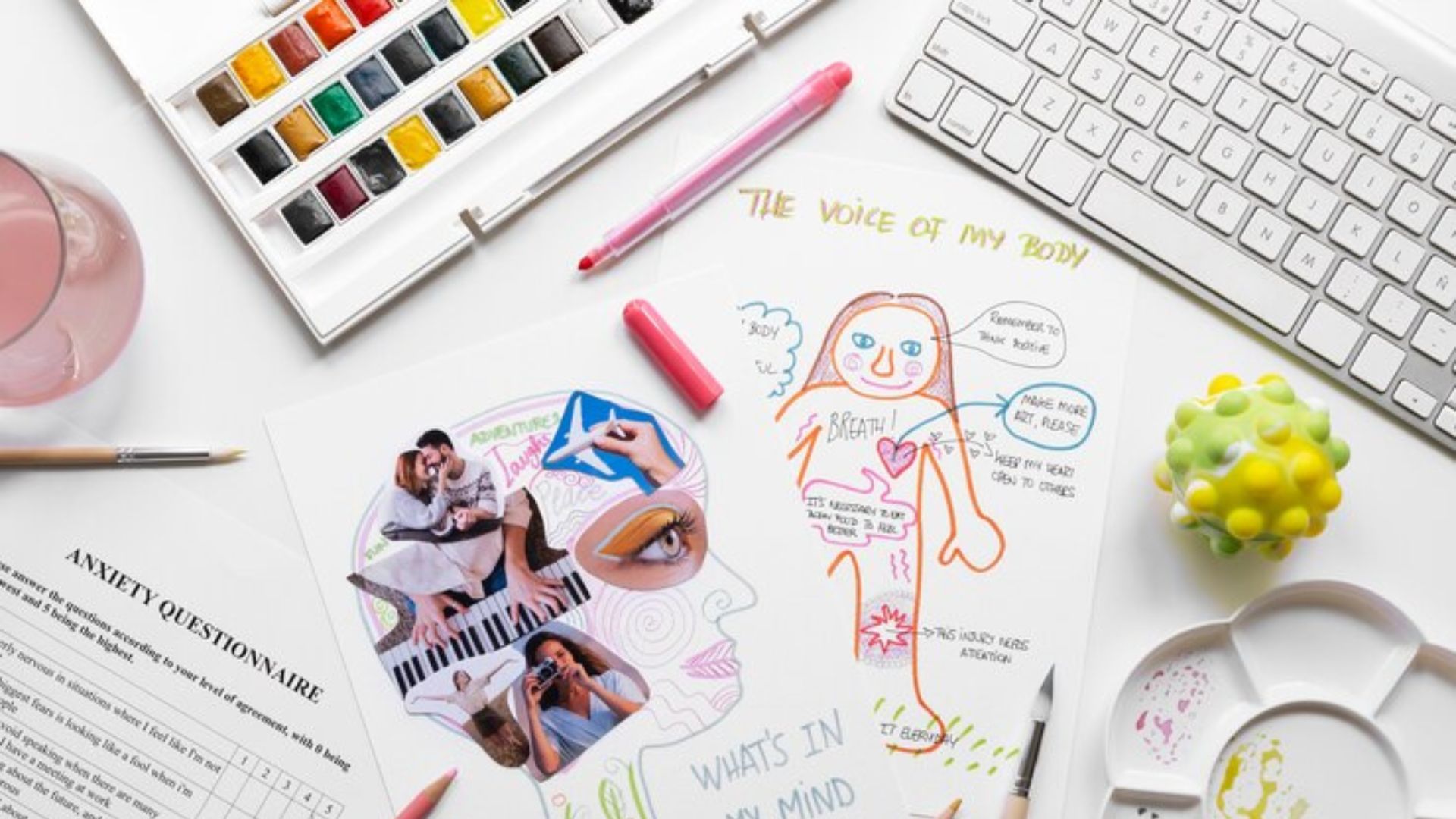Depression is a serious mental health condition that affects millions of people around the world. It is often characterized by persistent feelings of sadness, loss of interest in daily activities, and a range of physical and emotional symptoms. Managing depression symptoms effectively requires a comprehensive approach, often combining traditional treatment methods such as therapy and medication with creative techniques that promote mental well-being. This article will explore some creative ways to manage depression symptoms, offering practical solutions to help individuals cope and improve their quality of life.
Practice Mindfulness and Meditation
Mindfulness and meditation are powerful tools for managing depression symptoms. Mindfulness involves staying present in the moment and observing your thoughts and feelings without judgment. This practice can help individuals detach from negative thought patterns and reduce the overwhelming emotions that often accompany depression.
Meditation, on the other hand, allows for a deeper level of relaxation and mental clarity. Regular practice can reduce stress, enhance emotional resilience, and create a sense of inner peace. There are many types of meditation techniques, including guided imagery, body scanning, and focused breathing. Individuals can experiment with different methods to find what works best for them.
Engage in Creative Arts
Art therapy is a well-known approach to mental health that involves the use of creative expression to process emotions. Engaging in creative activities like painting, drawing, writing, or playing music can provide a cathartic release and help manage depression symptoms. These activities offer a way to express feelings that may be too difficult to verbalize.
Additionally, focusing on the creative process rather than the outcome can reduce pressure and expectations. This shift in focus can be incredibly freeing for individuals experiencing depression, as it allows them to embrace imperfection and explore their emotions without fear of judgment.
Exercise Regularly
Exercise is not only beneficial for physical health but also plays a significant role in mental well-being. Regular physical activity releases endorphins, which are chemicals in the brain that promote feelings of happiness and relaxation. Exercise can be a natural and effective way to combat depression symptoms by reducing stress and improving mood.
Even small amounts of exercise, such as a daily walk or yoga session, can make a noticeable difference in how a person feels. The key is to find an activity that feels enjoyable, as this increases the likelihood of sticking with it long-term. Incorporating exercise into a daily routine can help individuals regain a sense of control and improve their mental and emotional health.
Build a Routine
When dealing with depression, maintaining a structured routine can help individuals feel more grounded and motivated. Depression can often cause a sense of apathy, making even the simplest tasks feel overwhelming. A routine can help counter this by providing a sense of stability and predictability.
Start with small, manageable tasks, such as getting out of bed at a specific time, having regular meals, and scheduling time for relaxation. Gradually add more tasks as energy levels improve. Having a set routine can also improve sleep patterns, which is crucial for managing depression symptoms.
Connect with Nature
Spending time in nature has been shown to have numerous mental health benefits, especially for those struggling with depression. Natural environments can reduce feelings of anxiety and promote a sense of calm. Whether it’s a walk through a park, a hike in the woods, or simply sitting outside in a garden, nature can provide an escape from the stressors of daily life.
Studies have shown that spending time outdoors can lower cortisol levels, the hormone associated with stress. It can also boost mood and improve cognitive function. For individuals experiencing depression, connecting with nature can be a simple but effective way to rejuvenate the mind and body.
Try Aromatherapy
Aromatherapy is the use of essential oils to improve mental and physical well-being. Certain scents, such as lavender, chamomile, and bergamot, have been found to have mood-boosting properties and can help alleviate symptoms of depression. Aromatherapy can be practiced in several ways, including through diffusers, candles, or topical application.
The therapeutic properties of essential oils are believed to stimulate the limbic system, the part of the brain responsible for emotions. This can help to reduce feelings of anxiety, promote relaxation, and improve overall mood. For those who enjoy scents, aromatherapy offers a natural and soothing way to manage depression symptoms.
Practice Gratitude
Gratitude is a powerful practice that can help shift focus away from negative thoughts and bring attention to the positive aspects of life. Individuals who struggle with depression often find themselves fixated on what is wrong in their lives, which can exacerbate feelings of sadness and hopelessness. Practicing gratitude can break this cycle and promote a more positive mindset.
One way to incorporate gratitude into daily life is to keep a gratitude journal. Each day, take a few minutes to write down three things you are grateful for. These can be simple things like a warm cup of tea, a kind gesture from a friend, or a moment of laughter. Over time, this practice can help retrain the brain to focus on the good, fostering a greater sense of well-being.
Join a Support Group
Isolation is a common experience for individuals with depression, but connecting with others who understand what you’re going through can be incredibly therapeutic. Support groups provide a safe space where individuals can share their struggles, offer advice, and provide encouragement. Knowing that you are not alone can alleviate feelings of loneliness and provide valuable emotional support.
Support groups can be found in person or online, and they may be focused on specific issues such as depression, anxiety, or grief. Finding a group that resonates with your experiences can foster a sense of community and help individuals feel more empowered in their journey toward healing.
Explore Journaling and Writing
Journaling is a therapeutic activity that can help individuals process and release emotions. Writing about your thoughts, feelings, and experiences can provide insight into the root causes of depression symptoms and help develop coping strategies. Journaling can also help individuals track their progress, allowing them to see patterns in their emotions and behaviors over time.
Writing creatively, such as composing poetry or short stories, can be another way to manage depression symptoms. This form of creative expression allows individuals to explore their emotions through narrative, offering an outlet for self-reflection and healing.
Seek Professional Help
While the techniques listed above can be helpful, it’s important to remember that professional help is often necessary for managing depression. Therapists and counselors are trained to provide support and guidance tailored to an individual’s specific needs. Cognitive-behavioral therapy (CBT), dialectical behavior therapy (DBT), and other therapeutic modalities have been shown to be effective in treating depression.
Medication may also be prescribed to help manage the symptoms of depression. Antidepressants can help regulate mood and energy levels, allowing individuals to better engage in the healing process. If you’re struggling with depression, don’t hesitate to seek the help of a qualified mental health professional.
Conclusion
Managing depression symptoms requires a multifaceted approach, combining both traditional and creative techniques. Practices like mindfulness, exercise, and creative expression can provide valuable tools for reducing feelings of sadness and hopelessness. At the same time, maintaining a routine, connecting with nature, and seeking professional help can further support mental well-being. Depression is a challenging condition, but with the right strategies in place, individuals can regain control and work toward healing. By incorporating these creative approaches into daily life, it is possible to manage depression symptoms and improve overall mental health.
ALSO READ:Brain Health Improvement Habits: Simple Ways to Enhance Cognitive Function
FAQs
Can creative activities really help with depression?
Yes, creative activities like painting, writing, and music can help manage depression by providing an outlet for emotional expression and promoting relaxation.
How often should I practice mindfulness to see results?
For best results, aim to practice mindfulness daily, even if only for a few minutes. Consistent practice can help train the mind to stay present and reduce negative thought patterns.
Is exercise really effective for managing depression?
Yes, exercise is a proven method for managing depression. It releases endorphins, which improve mood and reduce stress, contributing to overall emotional well-being.
Can journaling help reduce depression symptoms?
Journaling can be very beneficial for managing depression. It allows individuals to process their emotions, reflect on their thoughts, and track their healing journey.
Should I rely solely on creative techniques to manage depression?
Creative techniques can be a helpful addition to your mental health toolkit, but they should be used alongside professional help, such as therapy or medication, for optimal results.







